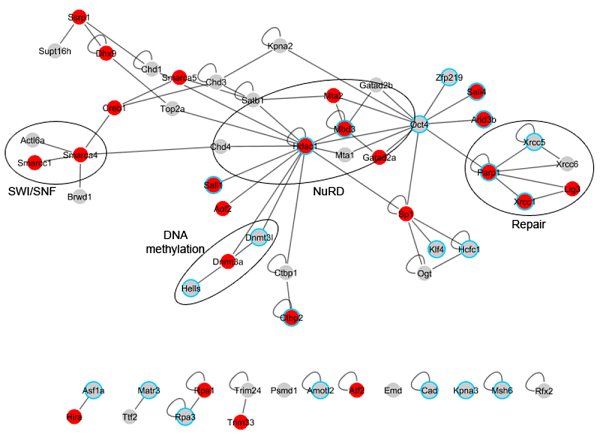Who speaks to whom in stem cell biology?

A new study teases apart the vital conversations carried out by a key protein in early embryo development. The researchers have identified multiple interactions of the protein Oct4 with other proteins in embryonic stem cells: it’s a Facebook of stem cell proteins.
Their work highlights that, in embryos, Oct4’s interactions play an important role in orchestrating correct development: just as important, Oct4 and its partners play a continued role such that, in later life, the genes encoding them can be mutated into cancer-causing genes.
Embryonic stem (ES) cells are derived from embryos and maintain the essential early embryonic ability to develop into any of the tissues that become part of an adult. Adult cells, for the most part, cannot move from their determined path: they will ever be liver cells, or kidney cells, or whatever fate has decided.
To restore the ability to become more than one cell type – called pluripotency by biologists – is important to biology, to understanding development and to developing new treatments based on ES cells.
“There are a small number of proteins that research has shown play a critical role in the processes of successfully producing embryonic stem cells. Oct4 is one of these. The important question is how does it have its effects?
“We have described an extended network of partners for Oct4 – almost 100 proteins -and discovered new partners that Oct4 talks to. Many are important not only in embryo development and in stem cell biology, but also is human disease. These are really exciting results.”
Dr Jyoti Choudhary Leader of the Proteomic Mass Spectrometry team at the Wellcome Trust Sanger Institute
Oct4 is one of the proteins that plays a pivotal role in embryos – and can play a role in reprogramming cells into becoming pluripotent. It carries out its roles by talking to other proteins, through protein-protein interactions.
The team developed a new method, which could be widely applied, to look at which proteins are part of the cellular conversations of Oct4. They added a signal to an Oct4 gene that would tag the Oct4 protein for purification and reintroduced the modified gene into mouse cells in an extra copy, but keeping the endogenous regulation.
They then pulled Oct4 from cells along with the proteins with which it was associated.
For more than 80 per cent of Oct4’s binding proteins, deletion leads to embryonic death, showing their partnership is important. At least half of the proteins are controlled by key regulators of development, suggesting roles for these in development as well.
Mouse partners of Oct4 and their human counterparts are more similar than the typical gene – their DNA sequence is 94 per cent identical – suggesting they play important and similar roles in the two species. Indeed, 14 Oct4 partners are linked with human disease: eight are known cancer-causing genes. Of the 14 genes, mutation in 13 in the mouse causes a change that closely resembles the human disease symptoms.
“We have found the contact list, seen who talks to whom and picked out the key members of the group. This approach can be widely used, giving us a systems biology description of protein interactions. This will be a driver in understanding embryo and stem cell biology and in examining human disease.”
Dr Mercedes Pardo First author on the study
More information
Funding
This work was supported by the Wellcome Trust and the Herchel Smith Research Studentship Fund
Participating Centres
- Proteomic Mass Spectrometry. Wellcome Trust Sanger Institute, Hinxton, Cambridgeshire, United Kingdom
- Mouse Genomics, Wellcome Trust Sanger Institute, Hinxton, Cambridgeshire, United Kingdom
- MRC Laboratory of Molecular Biology, Cambridge, United Kingdom
Publications:
Selected websites
The Wellcome Trust Sanger Institute
The Wellcome Trust Sanger Institute, which receives the majority of its funding from the Wellcome Trust, was founded in 1992. The Institute is responsible for the completion of the sequence of approximately one-third of the human genome as well as genomes of model organisms and more than 90 pathogen genomes. In October 2006, new funding was awarded by the Wellcome Trust to exploit the wealth of genome data now available to answer important questions about health and disease.
The Wellcome Trust
The Wellcome Trust is a global charitable foundation dedicated to achieving extraordinary improvements in human and animal health. We support the brightest minds in biomedical research and the medical humanities. Our breadth of support includes public engagement, education and the application of research to improve health. We are independent of both political and commercial interests.


